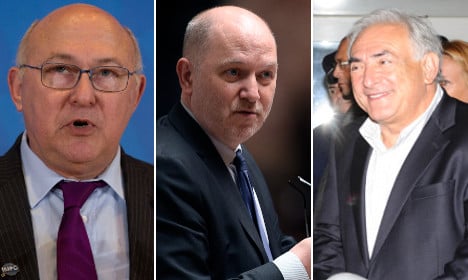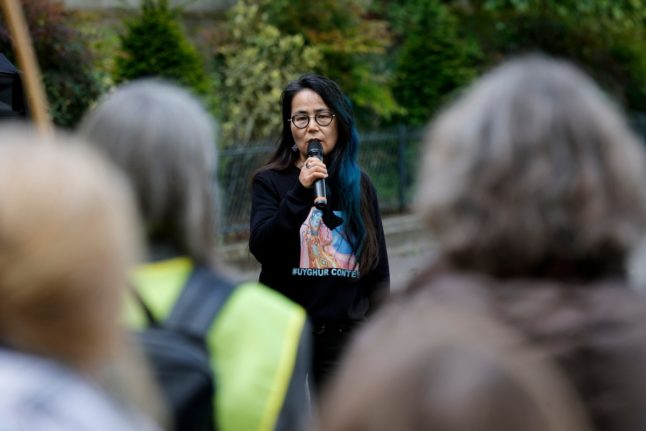Same old French politicians. Depressingly familiar.
These words sum up many of the reactions by foreign observers to the news that two high profile French lawmakers, including the country’s finance minister, had become embroiled in the latest sexual harassment scandals to hit French politics.
Firstly deputy parliamentary speaker Denis Baupin was accused of sexual harassing a number of women over several years, after which police opened an official investigation.
For his part Baupin launched legal action against his accusers.
Then, clearly feeling the heat as the spotlight was shone on the shoddy behaviour of some of France’s political elite, the Finance Minister Michel Sapin issued a mea culpa.
The minister and close ally of President François Hollande admitted he had acted “inappropriately” towards a French journalist during a visit to Davos. He confessed that he “made a comment to a female journalist about her clothing while placing my hand on her back.”
The minister had actually been accused of twanging the elastic on the journalist’s knickers as she bent over to pick up a pen.
Sapin insisted there was “no sexist intent” although he was widely ridiculed given that only hours earlier he had vehemently denied the accusations and threatened to sue those who repeated them.
The two cases have sparked yet more scrutiny of France’s male politicians and the way they behave – or more to the point misbehave – towards women.
It appears that the change in culture that was meant to take place after all the soul searching following the Dominique Strauss-Kahn scandals may not have come about as it was meant to have.
But while the shocking acts of the French politicians need to be condemned, is the country's political scene really infected by more sexist lecherous men than the world of politics in other countries?
Marie Allibert, the spokeswoman from French feminist organization Osez le Féminisme which is an outspoken critic of the actions of French politicians, believes France may not be worse than anywhere else.
“I don't think sexual harassment in politics is specific to France, there are affairs elsewhere in the western world too,” she told The Local.
“We live in a patriarchal, sexist world, in which sexual assault, harassment and rape are everywhere, on a daily basis. The difference is: we had DSK, and still, we did not learn from it.”
While other countries have had their fair share of political sex scandals it’s clear that France has problems. These problems were identified after the DSK scandal and have not been dealt with.
“Our political parties are still not doing enough to train their members to be respectful of women and of equality,” said Allibert. And our media still have not learned that they should not downplay sexual assaults, aggression, rape or even femicide,” she said.
So while the politicians themselves may not be more deviant than anywhere else, the problem is their antics remain hidden.
@frasermatthew they are certainly the most inclined to believe that their “power” will shield them from justice @TheLocalFrance
— Anna Di Mario (@AnnaDi_Mario) May 12, 2016
French political analyst Bruno Cautres believes it’s not just a case of the media downplaying sexual assaults by politicians, but more like avoiding them altogether.
Cautres, from France’s Center for Political Sciences Research believes the media in France do not hold their politicians to account enough and allow them to continue to work and act with a feeling of impunity.
“In France there is a lack of checks and controls on political life and we are not just talking about sexual harassment, but fraud and corruption as well,” Cautres told The Local.
“We saw that in the Cahuzac affair,” he added referring to the disgraced former Budget Minister Jérôme Cahuzac who admitted tax fraud.
As opposed to the Anglo media culture, dominated by the bloodthirsty tabloids, the French media still tends to leave the politicians private lives private.
If French politicians know they can pretty much do what they want privately without it ending up in headlines, it helps create a world where they feel untouchable by the media.
“In other countries there’s more control on politicians. The political class here feel a certain level of impunity,” said Cautres.
“There’s a lot of work to be done in France to make the politicians feel afraid of the media.
“It’s incredible that Michel Sapin did what he did to a journalist. He wasn’t scared. He just didn’t realise it was sexist.”
One of the explanations given for the media's attitude towards French politicians is that often journalists and politicians come from the same elite and study at the same elite universities.
Cautres also points out that the reality is that in France politics is still more of a male-dominated profession than in other countries.
“The world of French politics was for a long time a world only for men. The arrival of women on the scene is quite recent and so the old sexist stereotypes still persist,” he said.
Whether this week was the case of the same old French or not, it’s clear the world of French politics still has major work to do and it's unlikely we have seen the last sex scandal to rock French politics.



 Please whitelist us to continue reading.
Please whitelist us to continue reading.
Member comments